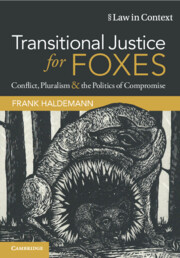2 - Conflict
Published online by Cambridge University Press: 24 November 2022
Summary
This chapter discusses the place of conflict in transitional justice. Building on a range of historical real-life examples, it argues that conflict is an important rather than incidental part of many, if not all, transitional justice processes. The chapter initially focuses on value conflicts and then turns to conflicts of interests (political power, offices, money, etc.). Drawing on recent realist work in political theory, the chapter argues that it is time to give politics its due and idealisation a rest in transitional justice. This is not an argument against ideals, but against an approach that is idealistic in the wrong sense, in such a way as to suppress, erase from view, real experiences of conflict. Towards the end, the chapter explores recent attempts in the transitional justice literature to take conflict more seriously, particularly Christine Bell’s account of transitional justice as bargaining.
Keywords
- Type
- Chapter
- Information
- Transitional Justice for FoxesConflict, Pluralism and the Politics of Compromise, pp. 44 - 94Publisher: Cambridge University PressPrint publication year: 2022

